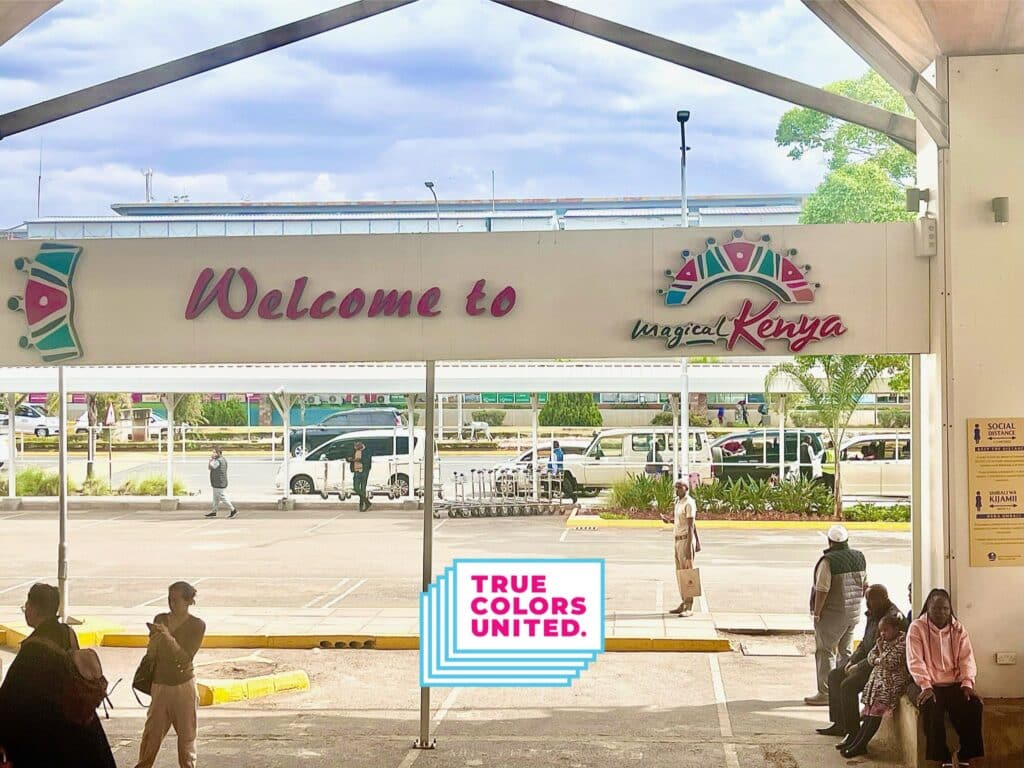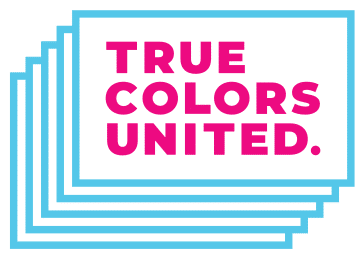From July 24-28, we had the opportunity to work in-person with our partners at KJHouse on the ground in Nairobi.

In a world where the struggle for LGBTQ+ liberation knows no borders, True Colors United is increasingly asking the question, “what is the state of LGBTQ+ youth homelessness outside of the United States?” The answer is varied, but in much of the Global South, this knowledge is local and experiential — known deeply by those working relentlessly to secure housing support for young people in their communities but relatively unknown to the rest of the globe. For over five years, True Colors United has been working to build mutually beneficial relationships with individuals and organizations leading this work in many regions, including Eastern Europe, Scandinavia, Central America, East Asia, and East Africa.
This July, our journey brought three members of our team – myself, Coco Wheeler, our Director of International Programs, and Twiggy Pucci Garçon, our Chief Strategy Officer – to Nairobi, where we spent time with our friends and partners at Kenneth and Jacob’s House (KJHouse) , the first LGBTQ+ youth housing program in the nation. Our shared objective was to continue to bridge geographical and cultural divides, to transcend international boundaries in pursuit of stronger relationships and to gain invaluable insights into the challenges and triumphs experienced by LGBTQ+ youth and those working to support them in Kenya.
Kenneth and Jacob’s House was founded in January 2020 by a gay couple (Kenneth and Jacob) who were touched by the challenges faced by young LGBTQ+ youth in their community, in part in response to the COVID-19 pandemic. They decided to pilot a shelter project, successfully hosting 10 LGBTQ+ individuals in crisis at their private home apartment for a span of 6 months. KJHouse is now a full-fledged homelessness services provider, offering intermediate-term shelter and care, psychosocial support, advocacy, and life skills to LGBTQ+ youth experiencing homelessness between 18-24 years old.
What did we experience during our time there?
Our friends at KJHouse invited us to attend a support group they host for the parents of LGBTQ+ youth – a critical part of a prevention strategy to solve homelessness and housing insecurity among LGBTQ+ youth. For a couple of hours, we sat quietly and listened to the stories of parents who’ve struggled through a journey of accepting their children for who they are despite the pressures of the family and community stigma that can so often place a wedge between LGBTQ+ young people and their parents. Parents shared their experiences of being estranged from their extended family members or forced to choose between their own children and their relationships with the people who make up their wider community of support. They discussed amongst each other the influences of religion and culture in their lives and the advice they’ve offered their children around safety and discrimination and how to protect themselves.
Later on, we had the opportunity to visit the new housing site that Kenneth and Jacob’s House opened recently and meet some of its residents. We shared a meal, had a tour, and heard from residents about their experiences, both with Kenneth and Jacob’s House and in the larger context of their families, communities, and experiences of housing and homelessness. A theme that emerged over and over was that the safety and security provided by KJHouse was providing the opportunity for reflection, creativity, and the emergence of a path to self-actualization. A transmasc resident in their early 20s talked about writing poetry in the mornings, reading books, and having the ability because of this housing to be thoughtful about how they wanted their life to unfold and how they could work to achieve their goals. This is the essential purpose of housing support for young people, when done well.
Before we left, we sat down for an interview with the core individuals involved in the center of KJHouse, people who serve as the day-to-day contacts for their client base and the LGBTQ+ community and who keep the work moving forward. This brings us back to the question we posed earlier in this blog post – What is the state of LGBTQ+ youth homelessness outside of the United States? And specifically, what is the state of LGBTQ+ youth homelessness in Nairobi and other areas of Kenya? They shared that youth homelessness is largely invisible in Nairobi. The overwhelming perspective experienced by the folks at KJHouse when they explain their work to others in their community is that young people are never homeless, that everyone could always surely find a family member or friend who they could live with. This is the overwhelming challenge they face in building community support for the work they undertake. This aligns with our knowledge of there not being any published research that demonstrates the incidence of homelessness among LGBTQ+ young people or the experiences of LGBTQ+ young people who are unhoused in the entirety of the region of East Africa.
So what’s next?
Through our work with KJHouse, the need for data has become readily apparent, leading us to co-develop a research project that closes this information gap. Partnering with US-based and Kenya-based academic researchers, practitioners, activists, and youth with lived experience of homelessness, we will be surveying LGBTQ+ young people across Kenya to learn about the causes of housing insecurity in their communities, the challenges young people face in accessing housing and services, and the solutions that young people support.
We’re very excited to be nearly ready to launch this research project. The final hurdle standing between KJHouse and True Colors United and the official launch of the East African research is funding. At True Colors United, we know that our liberation is tied inextricably to the liberation of people who’ve been marginalized all across the world. As Maya Angelou said, “The truth is, no one of us can be free until everybody is free.” We’re invested in the advancement of housing justice globally. With your support, we can deepen that investment in an area of our work that promises some of the greatest possible impact.
